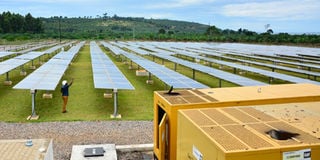Promote clean renewable energy

The government of Uganda and that of the UK signed a Compact Agreement under which the country committed to promoting and expanding investments in off-grid solar opportunities for people as opposed to reliance on hydro and fossil fuel-based grid.
It was recognised that the grid electrification could not improve access to clean energy for Ugandans, especially for vulnerable groups such as women, youth and others where more than 80 per cent of the population remain reliant on biomass energy and other dirty sources.
The agreement was a recognition that grid electricity and use of fossil fuels were the biggest obstacles to improving clean energy access to uplift the living standards of people, especially for the vulnerable groups such as women.
It is clear that grid and fuel based electrification remains unaffordable, unreliable and consequently, this undermines efforts to improve services in education, health, clean water, environmental conservation and others.
The country is richly endowed with abundant energy resources, which are fairly distributed across the country with an average of 5.1 kWh/m2 of solar energy, access to quality solar energy remains low with progress in the sector curtailed by a number of challenges like poor coordination by government for off-grid connections.
In the presence of Covid-19 pandemic, this should be an opportunity for us to rethink our economic growth path that has come at a heavy cost to the people and planet to bring about a fundamental shift for the clean energy transition.
The policy makers should not lose sight of the looming climate crisis, but rather design economic stimulus packages with social inclusion and environmental sustainability built into every decision in particular sustainable energy development.
It is clear that we are living in truly unprecedented times, and the country faces unique energy challenges that undermine the ability of government to respond to this crisis and build economic resilience.
Renewables can underpin these efforts and therefore can play an instrumental role in both the response and the recovery.
According to International Renewable Energy Agency’s recently launched Global Renewables Outlook report, renewables can supply more than half of all power needs in Africa alone by 2030, boosting the regional economy by more than 4.4 per cent and growing jobs by close to 50 per cent in the process.
For instance, in the recent Covid-19 policy report for Asia and the Pacific, it identified renewable energy as one of the main sectors to stimulate countries’ economies with people’s standards of living.
Therefore, government should deploy renewable energy. If clean energy is rapidly and well-placed, it can support immediate crisis response efforts including electrification of public health value chains, improving the education system, improve businesses opportunities, among others.
Mr Edema is an Environmental engineer




